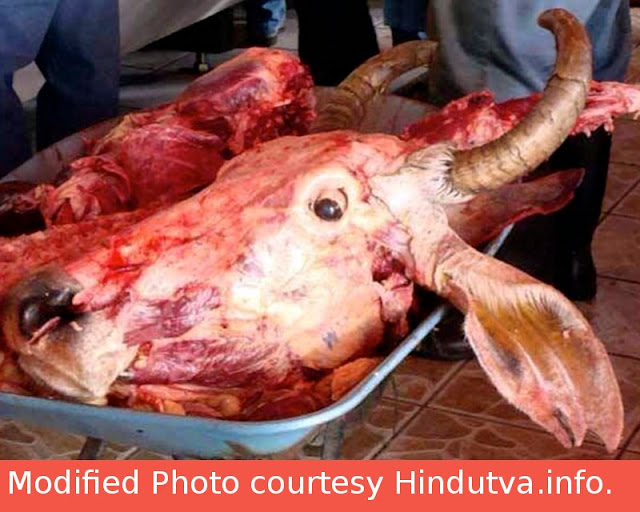Questions and Answers
Welcome to questions. Shall answer to the best of ability. No ill-will to you and vice versa.
Should we be first good to human beings before becoming good to plants and animals?
--Ans: Goodness to humans and goodness to plants/animals are not mutually exclusive. Any of the two can take place first. Or both can occur simultaneously. Both are, actually mutually inclusive. A person who is good to his co-humans will be equally so good to the plants and animals. A person who tends to be bad to humans, will tend to be bad to plants and animals.
There is a vegetarian community which rigorously follows vegetarianism. It lends money at usurious rates of interest, black-markets commodities, adulterates foods, grabs lands. Bribes employees, officials and politicians. Evades taxes. Do you say that they are better citizens than law-abiding and tax-paying non-vegetarians?
--Ans: A person is good in area means that he is good in that area. There are no mathematically quantifiable or measurable parameters for the qualities of human virtuousness. 'Right living' and 'Right livelihood' have not yet evolved as sciences. Ethics and morals have become evasive owing to the abstract nature of definitions. The saga of human from a state of 'unhappy-virtue-less living' to the 'happy-virtue-ful' living is a continuum of numerous sets of combinations quality x, quality y ...quality n.
We have in economics a technique called 'Indifference Curve' analysis. The indifference curve connects all such points on the graph which give equal satisfaction to the consumer, with a balance of quantity 'a' of product 'x' and quantity of product 'y'.
E.g. One slice of bread, 200 gms. of meat.
Two slices of bread, 100 gms. of meat.
Three slices of bread, 80 gms. of meat.
Four slices of bread, 70 gms. of meat.
If a consumer gets equal satisfaction from all the four combinations, by connecting them we get an indifference curve. If the consumer wants to raise his levels of satisfaction, then he has to go for new sets of combinations of quantities and qualities of products.
The same is the case with several human qualities.
E.g. : An employer is searching for employees to constitute a team for an I.T. program:
He can never get persons with 100% efficiency and 100% trustworthiness. Suppose he needs four employees. An indifference curve of something like the following may evolve:
Employee 1 : 75% efficient + 25% trustworthiness.
Employee 2 : 50% efficient + 50% trustworthiness.
Employee 3 : 25% efficient + 75% trustworthiness.
Employee 4 : 43% efficient + 57% trustworthiness.
Rarely he can go for 0% efficiency or 0% trustworthiness. That will be too utopian. The nature of the job will influence the employer's decisions. He may go for the tribe of employee 3, if the job needs more people of great trustworthiness such as keeping military secrets. If the job needs speed and efficiency, the employer may go on to constitute teams consisting of employee type 1.
A Nation can have different indifference curves, because its needs are divergent. For this reason only, Nations have places for artists, butchers, cooks, doctors, engineers, farmers, gynaecologists, historians, industrialists, judges, knitters, lorry-drivers, music-makers, noise-makers, oncologists, policemen, quarrymen, rag-pickers, sweepers, teachers, undertakers and underwriters, vendors, watchmen, xerox-operators and what not?
England was once called a Nation of Traders. This could never have happened. A trader cannot undertake any overseas trade if he cannot charter a ship manned with sufficient number of sailors who are not only capable of operating the ship's sails, but also adept in fighting pirates, enemies and even strangers.
Every cog is important in a machine. Otherwise, it will not function properly if even one screw becomes loose. A society also needs combinations of different types of members with a spread of assorted skill and habit sets.
It may, superficially appear that Bill Gates or Warren Buffet are the most indispensable for a society. A day will come, when it will have to recognise that a petty cobbler is as important as Angelina Jolie or Jessica Alba.
Question: Can you kill an animal and eat it? Many people say they stop eating meat after seeing a suffering animal being killed for meat.
--Ans: This is more, the issue of a habit. A habit reduces perceived pain. A person killing a chick or a goat for the first time may undergo some pain. But habit makes the difference. A boy or girl undergoing sexual intercourse may also suffer from pain owing stiffness of vagina or penis. They learn to draw thrill from subsequent experiences. A girl freshly introduced into prostitution may hate her first experience as an unforgettable misery. She may learn to be happy with subsequent experiences with different types of clients.
Excess exposure and experience can reduce the thrill and lead to indifference. Experience is like a reversed 'U' curve in marketing. This is analogous to a product maturity curve in marketing. A product sprouts, rises, grows, matures and reaches it zenith, descends, and finally sets in the market.
We can do the most unpleasant things in the world, by cultivating them. A delicately emotional person can cultivate to behead chicken or sheep, if it becomes uunavoidable.
I have learnt from some friends that some Indian veterinary doctors hailing from orthodox vegetarian families started facing this problem when they went to United States to work in abattoirs. Their jobs consisted of either direct slaughtering, or supervising men and machines slaughtering in Chicago or Dallas or some American City. There was only one choice. Learn or leave. They have learnt.
As far as inflicting injury to a living being is concerned, we cannot find much difference between cutting a rugged-gourd or bottle-gourd and beheading a cock/cow/goat/sheep. The cock/cow/goat/sheep may cry/screech/shriek/yell/wail at the top of its voice. A bottle-gourd/rugged gourd may not cry. A banana may not cry when we pluck it from the cluster. We cannot conclude that it will not experience pain, simple because we cannot hear it. We should have the heart to imagine it. Even a hill may weep when we cut a stone from it. A day may come when science will start recognising that even hills have lives and pain.
What should a human then do? Should he/she stop eating bananas and cucumbers? Should he stop mining? Won't all the civilisation come to a stand-still?
--Ans. Humans cannot survive without hurting animals/nature/plants. But we can try to keep the damage to the minimum. This is what our ecoologists and environmentalists also say. We have to learn to survive with 'minimum'. E.g. : Electricity. Fossil fuels. We have to manage with minimum. Else, we shall be guilty of violence.


